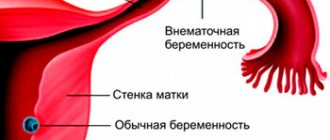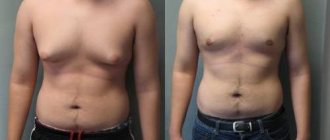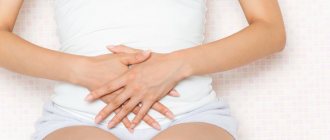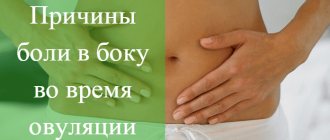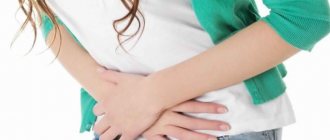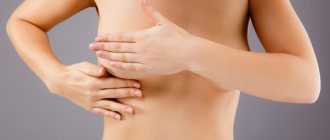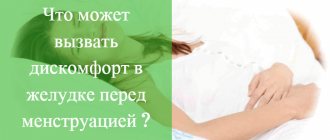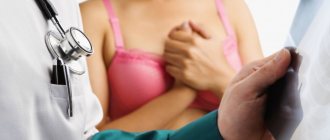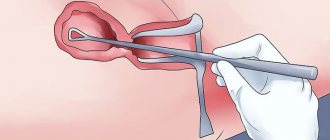The occurrence of periodic pain in the chest is most often associated with the onset of menstrual periods. The cause of pain is physiological; it is caused by structural changes in gland tissue under the influence of sex hormones. But there are cases when, after menstruation ends, chest pain remains.
In this article we will try to figure out why breasts hurt after menstruation and nipples swell, in which cases this can be considered a normal option, and when it is necessary to consult a specialist.
Nature of pain
Normally, your breasts should not hurt after your period. If the critical days have passed, and she continues to get sick, this is a signal that abnormal processes are occurring in the body. There are several types of pain in the mammary glands, and each of them will indicate different conditions:
- cyclic pain appears on clearly designated days of the menstrual cycle; usually the mammary gland begins to ache 5-7 days before the arrival of menstruation. This occurs due to increased estrogen levels and increased body fat. As soon as menstruation occurs, this symptom ceases to bother the woman. Such painful sensations are repeated in each cycle, which explains their name. This is usually an aching pain that is felt in both glands;
- non-cyclic pain can occur on any day of the menstrual cycle, its causes are not related to monthly hormonal changes in the female body, and pain can manifest itself in only one breast;
- Acute pain is one of the normal options when the mammary gland hurts very much before menstruation, but it can also be caused by a breast injury or a cyst bursting inside the gland. To find out the exact cause, it is better to undergo an ultrasound examination. If there is mastitis, then acute pain is accompanied by fever and general weakness.
There are several other types of pain in the mammary glands:
- burning – it intensifies when touching the chest and can be projected onto the back;
- stabbing – occurs in attacks and is localized only in one of the glands;
- aching – is felt constantly, but has different intensity. With such a symptom, a woman can put off visiting a doctor for a long time, because she quickly gets used to the unpleasant sensation.
Do breasts grow after menstruation?
In still developing girls, the mammary glands grow constantly, greatly increasing in size before menstruation. Due to growth, breasts may remain sensitive even after menstruation. But more often this happens due to a bra that has already become tight or a “game of hormones” in the developing body.
In a mature woman, at the end of menstruation, the breasts return to their previous size. If after your period your breasts become rounded and heavy, you should buy a pregnancy test at the pharmacy.
On a note! The presence of menstruation does not always mean the absence of pregnancy.
There are often cases when menstruation occurs “through” pregnancy, but hormonal changes in the body have already begun. In this case, the onset of pregnancy is indicated by the fact that after menstruation the breasts have filled out and not fallen off.
After menstruation, stomach and chest hurt
Most often, similar pains do not occur at the same time. And the most likely reason that the lower abdomen and chest hurt at the same time after menstruation is a hormonal imbalance. But the hormonal balance itself is not disturbed. This requires certain conditions. Hormonal imbalances can occur due to diseases of internal organs and other factors:
- age-related changes (menopause);
- sexually transmitted diseases;
- taking hormonal medications (they are not only contraceptives);
- parasitic infestations;
- degenerative changes in the spine;
- stress.
In addition, pain in the lower abdomen can be caused by urolithiasis or gastrointestinal problems. With internal pain, it is often difficult to recognize the lesion.
Causes of pain
Chest pain is medically called mastalgia, and about 80% of all women experience it in various situations. This phenomenon is most painful during puberty, pregnancy and menopause. Also, the mammary gland can hurt with the active growth of glandular tissue. Let's consider the main factors that cause breast swelling and pain in women at different periods of their lives.
Pregnancy
During pregnancy, the level of estrogen increases, due to which the mammary glands enlarge, their growth causes the period to pass and the breasts to hurt. After conception, active hormonal changes begin, affecting all organs and systems, including the mammary glands, so if a woman is sexually active, then to find out the reason why the breasts are swollen immediately after menstruation, you must first take a pregnancy test. In addition, mastalgia can also occur with ectopic fetal development, which does not exclude the presence of menstruation; this should be remembered.
If your breasts hurt after menstruation, and the test is negative, then most likely the woman is sick and cannot do without the help of a doctor.
Hormonal disbalance
Painful and swollen breasts after menstruation may be due to hormonal imbalance. The following reasons can cause hormonal imbalances:
- tumors, especially in the upper body;
- menopause;
- venereal diseases;
- oral contraceptives;
- heredity;
- irregular sex;
- taking hormonal, sedatives and antidepressants.
Diseases
If your breasts begin to hurt after your period and the pregnancy test is negative, you need to pay attention to other symptoms, perhaps they will tell you what pathology is causing your swollen breasts:
- mastopathy develops against the background of hormonal disorders and is accompanied by pain and lumps in the chest, as well as a feeling of heaviness. Symptoms appear before, during and after menstruation;
- mastitis is an inflammation of the breast tissue caused by a bacterial infection. Most often, mothers suffer during lactation, but a non-breastfeeding woman can also get mastitis;
- cyst - a neoplasm in the breast that occurs due to lipid metabolism disorders;
- cancer. With the rapid growth of the tumor, severe pain is felt, although obvious symptoms appear only in the later stages, so if the mammary glands swell regardless of menstruation and conception, you need to urgently go to a mammologist.
Also, the reason that the mammary glands are sensitive and painful can be gynecological problems: endometritis, adnexitis, vulvitis, inflammation of the appendages and endometriosis. Additional symptoms in this case will be pain in the lower abdomen.
Diseases of other organs
Not only diseases of the reproductive system can cause pain in the mammary gland; the following pathologies can be a possible reason for the fact that it is full:
- hormonal disorders due to problems with the thyroid gland and endocrine system;
- osteochondrosis;
- inflammation of the lymph nodes in the armpits;
- heart diseases;
- mechanical damage to the chest (compression, blows and bruises).
Nipple discharge
Discharge from the nipples can occur due to pathological abnormalities or during normal cyclic processes.
Experts say that discharge can only occur during pregnancy. In all other cases, it is worth finding out the reason. Discharge from the breast, except during the lactation period, may appear in the following situations :
- With strong sexual arousal during the period of stimulation of the areola area.
- A few drops of light liquid may come out if you press on the nipple before menstruation. At this point, a burning sensation may appear in the chest.
If the fluid released from the breast is not milk, then it is considered abnormal discharge. At the appointment, the mammologist is obliged to clarify the exact consistency and color of this discharge.
If, when squeezing the nipple, a thick, brown, slightly sticky liquid is released, or the discharge has a greenish tint, then ectasia of the milk ducts is considered a possible cause. It is observed in women during menopause.
If the discharge has a brown color, which ranges from light to dark, then this may indicate intraductal papilloma. She needs rapid diagnosis and treatment.
If purulent, scanty discharge from the mammary gland appears, which has an unpleasant odor and occurs during breastfeeding, this may be mastitis. In this case, only one mammary gland hurts. Her skin will be hot to the touch
Other reasons
If your period is over and your breasts hurt, and none of the above reasons have been identified, then you should consider other factors that cause pain in the mammary glands:
- uncomfortable or incorrectly selected underwear. A bra of the wrong size and irregular shape can put pressure on the breast gland, and rough seams and synthetic material can also cause discomfort. Due to tight underwear, blood circulation is impaired, which can subsequently lead to breast diseases;
- taking medications. Some medications, especially oral contraceptives and antidepressants, can change hormonal levels, thereby causing chest pain. Due to the use of such medications, the mammary gland begins to increase in size, which causes pain. If you take the pills regularly, then the body will adapt to new changes after 3 months, otherwise you should urgently go to the doctor;
- Sun rays. Due to prolonged exposure to the sun, the production of estrogen and testosterone increases, which leads to hormonal imbalance and, as a result, chest pain. In addition, the sun's rays can dry out the delicate skin of the mammary glands and cause a burn, which can subsequently develop into an oncological problem;
- stress and nervous tension are accompanied by a hormonal surge, which causes pain in the mammary glands. You should bring more positive emotions into your life; this will have a beneficial effect on the whole body, and not just on the chest;
- Irregular sex life causes hormonal imbalances and depression. Both of these consequences of lack of sex can cause pain.
What to do
If your breasts hurt after menstruation, you should definitely consult a doctor. He will conduct additional examinations and prescribe adequate treatment. If the mammary glands hurt regularly, it is advisable to keep a special diary, which notes the date of occurrence of the discomfort symptom and its intensity. Such information will help the doctor understand the nature of the pain and quickly determine why the chest hurts.
To begin with, the doctor will do a survey to take an anamnesis, then conduct a palpation examination of the mammary glands. If they continue to get sick a week after their period, it is advisable to take a pregnancy test and a blood test for hCG before visiting the doctor. A specialist may additionally prescribe a number of studies:
- mammography;
- Ultrasound;
- X-ray examination of cystic formations of the mammary glands;
- X-ray with the introduction of contrast into the mammary gland;
- puncture biopsy.
The treatment method will be chosen by a specialist depending on the identified cause of breast pain. If this is a disease, then it is necessary to treat the root cause. In the case of mastopathy, hormonal medications and a special diet may be prescribed, but if cancer or cysts are to blame, then treatment may involve surgery and chemotherapy.
There are symptoms that accompany breast tenderness, and if detected, you should immediately consult a doctor:
- pain in the chest continues for more than 2 weeks with fluctuations in intensity;
- lumps, nodules and altered shapes are felt in the chest;
- there is inflammation in the mammary gland;
- pain is projected to the armpit;
- with acute attacks of chest pain;
- if fluid with blood is released from the nipple;
- the glands have become asymmetrical;
- there are flaky and itchy areas on the chest;
- the temperature rises.
Treatment for chest pain
The main rule of therapy is timely consultation with a doctor. The purpose depends on the cause that provoked the appearance of the symptom.
If unpleasant sensations occur regularly, experts recommend keeping records with the dates of spasm occurrence, levels of its severity, duration and accompanying symptoms. Such a diary will help reproduce the full picture of the pathological sign at a doctor’s appointment.
Usually, a trip to the gynecologist begins by asking the patient about the nature of the pain. Then the doctor palpates the mammary glands and armpits to identify unnatural deformations and seals. If there are any, the woman is sent for a mammogram or ultrasound examination, and is also asked to undergo tests.
Benign tumors are removed surgically. Single small cysts cannot be removed, but are observed. Malignant tumors undergo chemotherapy.
Mastopathy is treated with special medications in the form of tablets and hormone-containing ointments.
In order for the bust to stop soreness, it is allowed to use drugs that reduce pain - Ibuprofen or Naproxen. You need to be careful when taking medications before visiting a doctor, because sometimes the breasts hurt after menstruation due to pregnancy.
Treatment will vary depending on whether your chest pain is cyclical or non-cyclical. Before treatment, the doctor will take into account the patient's age, medical history and severity of pain.
Treatments for cyclic pain include:
- dietary changes;
- avoiding or reducing caffeine consumption;
- reducing sodium intake;
- vitamin E and calcium supplements;
- use of oral contraceptives;
- taking thyroid hormones;
- use of estrogen blockers such as Tamoxifen;
- Wearing a support bra 24 hours a day.
To determine the proper treatment for non-cyclical breast pain, a physical examination will be performed and a mammogram or breast ultrasound will be ordered. If cystic changes in the breast are detected, the mammologist may do a needle biopsy (a thin needle is inserted into the cavity of the cyst to remove a small sample of tissue for examination). Pain medications may be recommended.
If your breasts hurt after your period, you need to pay due attention to your health. It is important to remember that the sooner a woman begins treatment, the easier it will be for her to avoid the occurrence of pathologies in the future.
The action of the drug is aimed at reducing the production of prolactin, which is always produced in the body during pregnancy. However, if chest pain after menstruation was not provoked by an excess of this hormone, this drug is not prescribed.
To get rid of this problem, you need to drink Mastodinon for at least 3 months. Also, for women who complain of chest pain that occurs after menstruation, doctors prescribe Aevit, a vitamin medication that has an immunostimulating and antioxidant effect on the body.
Prevention
There are no one hundred percent effective methods for getting rid of pain in the chest, but in order to reduce the risk of uncomfortable symptoms, you need to follow simple but very effective recommendations that will help improve women’s health in general:
- you need to limit your consumption of alcoholic beverages and stop smoking;
- Stress and nervous tension should be avoided;
- in the initial period of the menstrual cycle, you need to limit lifting weights and playing sports;
- you need to take vitamins;
- in the absence of contraindications, you should regularly take baths with sea salt;
- you should choose bras that are sized and do not leave marks on the body;
- do not overcool or overheat;
- when your chest hurts, you cannot tolerate it, just like when you have a headache, you should definitely take antispasmodics;
- properly selected oral contraceptives will help prevent chest pain;
- you need to have sex regularly with a regular sexual partner;
- You should review your diet and exclude spicy, fatty, salty and sour foods from it, and immediately before menstruation, remove coffee and chocolate from the menu.
Regular visits to your doctor will help prevent the development of many diseases, and if you experience any discomfort in the chest, you should not wait for a preventive examination, but immediately make an appointment with a specialist.
Related articles:
- breast pain before menstruation
- chest pain during menstruation
- breast pain in the middle of the cycle
